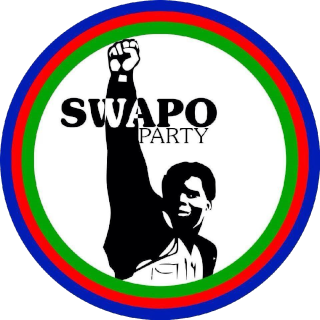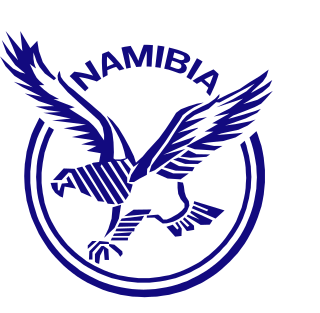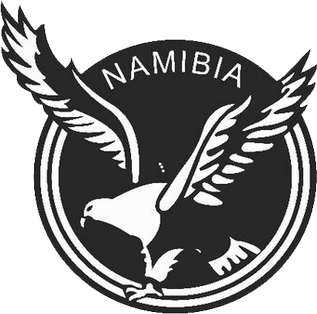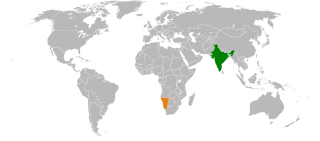Twenty-first century
Years in South West Africa | |
|---|---|
| Sovereign states |
|
States with limited recognition | |
Dependencies and other territories |
|
This is a timeline of History of Namibia . Each article deals with events in Namibia in a given year.

Namibia, officially the Republic of Namibia, is a country in Southern Africa. Its western border is the Atlantic Ocean. It shares land borders with Zambia and Angola to the north, Botswana to the east and South Africa to the south and east. Although it does not border Zimbabwe, less than 200 metres of the Botswanan right bank of the Zambezi River separates the two countries. Its capital and largest city is Windhoek.

Namibia follows a largely independent foreign policy, with strong affiliations with states that aided the independence struggle, including Nigeria, Libya, and Cuba.

South West Africa was a territory under South African administration from 1915 to 1990, after which it became modern-day Namibia. It bordered Angola, Botswana, South Africa, and Zambia. During its administration, South Africa applied its own apartheid system in the territory of South West Africa.

The South West Africa People's Organisation, officially known as the SWAPO Party of Namibia, is a political party and former independence movement in Namibia. Founded in 1960, it has been the governing party in Namibia since the country achieved independence in 1990. The party continues to be dominated in number and influence by the Ovambo ethnic group.

The Namibia dollar has been the currency of Namibia since 1993. It is normally abbreviated with the dollar sign ($), or alternatively N$ to distinguish it from other currencies called “dollar.” It is divided into 100 cents.

The Namibia national rugby union team represents Namibia in men's international rugby union competitions nicknamed the Welwitschias, are a tier-two nation in the World Rugby tier system, and have participated in seven Rugby World Cup competitions since their first appearance in 1999. They are governed by the Namibia Rugby Union.

The flag of Namibia was adopted on 21 March 1990 upon independence from South Africa.

The Namibia national football team represents Namibia in men's international football and is controlled by the Namibia Football Association. They have never qualified for the FIFA World Cup but have made four appearances in the Africa Cup of Nations. The team represents both FIFA and Confederation of African Football (CAF).

Hage Gottfried Geingob was a Namibian politician who served as the third president of Namibia from 2015 until his death in February 2024. Geingob was the first Prime Minister of Namibia from 1990 to 2002, and served as prime minister again from 2012 to 2015. Between 2008 and 2012 Geingob served as Minister of Trade and Industry. He also served as president of the ruling SWAPO Party from 2017 until his death.

The National Assembly is the lower chamber of Namibia's bicameral Parliament. Its laws must be approved by the National Council, the upper house. Since 2014, it has a total of 104 members. 96 members are directly elected through a system of closed list proportional representation and serve five-year terms. Eight additional members are appointed by the President. Since 2015, SWAPO member Peter Katjavivi has been the Speaker of the National Assembly.

The Namibia Football Association (NFA) is the governing body of football in Namibia. It was founded in 1990, and affiliated to FIFA and to CAF in 1992. It organizes the national football league and the national team. Its aim is to create a football culture and industry that provides entertainment and economical benefits for all; to become a dominant national association within the confederation via the professionalism of the game's administration; to promote education and development programmes in all aspects of the game, particularly regarding youth and women's football; and to provide a force for cohesion in society.

Namibian passports are travel documents issued to citizens of Namibia by the Ministry of Home Affairs and Immigration for international travel.

Namibia first participated at the Olympic Games in 1992, and has sent athletes to compete in every Summer Olympic Games since then. Namibia has never participated in the Winter Olympic Games.

Namibia – United States relations are bilateral relations between Namibia and the United States.
Karl Otto Ludwig Klaus Dierks was a German-born Namibian deputy government minister, a transport planner and civil engineer in Namibia.

Namibia is divided into 14 regions subdivided, which are further subdivided into 121 constituencies. The administrative divisions of Namibia are tabled by Delimitation Commissions and accepted or declined by the National Assembly.

India–Namibia relations are the current and historical relations between India and Namibia. India has a high commissioner in Windhoek and Namibia has a high commissioner in New Delhi. Namibia's high commissioner is also accredited for Bangladesh, the Maldives and Sri Lanka. In 2010, relations were described by Indian officials as "warm and cordial".

Namibia is a multilingual country in which German is recognised as a national language. While English has been the sole official language of the country since 1990, in many areas of the country, German enjoys official status at a community level. A national variety of German is also known as Namdeutsch.